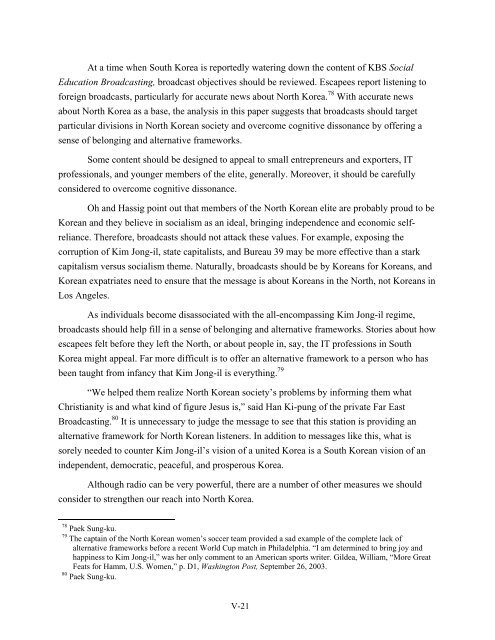North Korean Policy Elites - Defense Technical Information Center
North Korean Policy Elites - Defense Technical Information Center
North Korean Policy Elites - Defense Technical Information Center
Create successful ePaper yourself
Turn your PDF publications into a flip-book with our unique Google optimized e-Paper software.
At a time when South Korea is reportedly watering down the content of KBS Social<br />
Education Broadcasting, broadcast objectives should be reviewed. Escapees report listening to<br />
foreign broadcasts, particularly for accurate news about <strong>North</strong> Korea. 78 With accurate news<br />
about <strong>North</strong> Korea as a base, the analysis in this paper suggests that broadcasts should target<br />
particular divisions in <strong>North</strong> <strong>Korean</strong> society and overcome cognitive dissonance by offering a<br />
sense of belonging and alternative frameworks.<br />
Some content should be designed to appeal to small entrepreneurs and exporters, IT<br />
professionals, and younger members of the elite, generally. Moreover, it should be carefully<br />
considered to overcome cognitive dissonance.<br />
Oh and Hassig point out that members of the <strong>North</strong> <strong>Korean</strong> elite are probably proud to be<br />
<strong>Korean</strong> and they believe in socialism as an ideal, bringing independence and economic selfreliance.<br />
Therefore, broadcasts should not attack these values. For example, exposing the<br />
corruption of Kim Jong-il, state capitalists, and Bureau 39 may be more effective than a stark<br />
capitalism versus socialism theme. Naturally, broadcasts should be by <strong>Korean</strong>s for <strong>Korean</strong>s, and<br />
<strong>Korean</strong> expatriates need to ensure that the message is about <strong>Korean</strong>s in the <strong>North</strong>, not <strong>Korean</strong>s in<br />
Los Angeles.<br />
As individuals become disassociated with the all-encompassing Kim Jong-il regime,<br />
broadcasts should help fill in a sense of belonging and alternative frameworks. Stories about how<br />
escapees felt before they left the <strong>North</strong>, or about people in, say, the IT professions in South<br />
Korea might appeal. Far more difficult is to offer an alternative framework to a person who has<br />
been taught from infancy that Kim Jong-il is everything. 79<br />
“We helped them realize <strong>North</strong> <strong>Korean</strong> society’s problems by informing them what<br />
Christianity is and what kind of figure Jesus is,” said Han Ki-pung of the private Far East<br />
Broadcasting. 80 It is unnecessary to judge the message to see that this station is providing an<br />
alternative framework for <strong>North</strong> <strong>Korean</strong> listeners. In addition to messages like this, what is<br />
sorely needed to counter Kim Jong-il’s vision of a united Korea is a South <strong>Korean</strong> vision of an<br />
independent, democratic, peaceful, and prosperous Korea.<br />
Although radio can be very powerful, there are a number of other measures we should<br />
consider to strengthen our reach into <strong>North</strong> Korea.<br />
78 Paek Sung-ku.<br />
79 The captain of the <strong>North</strong> <strong>Korean</strong> women’s soccer team provided a sad example of the complete lack of<br />
alternative frameworks before a recent World Cup match in Philadelphia. “I am determined to bring joy and<br />
happiness to Kim Jong-il,” was her only comment to an American sports writer. Gildea, William, “More Great<br />
Feats for Hamm, U.S. Women,” p. D1, Washington Post, September 26, 2003.<br />
80 Paek Sung-ku.<br />
V-21













